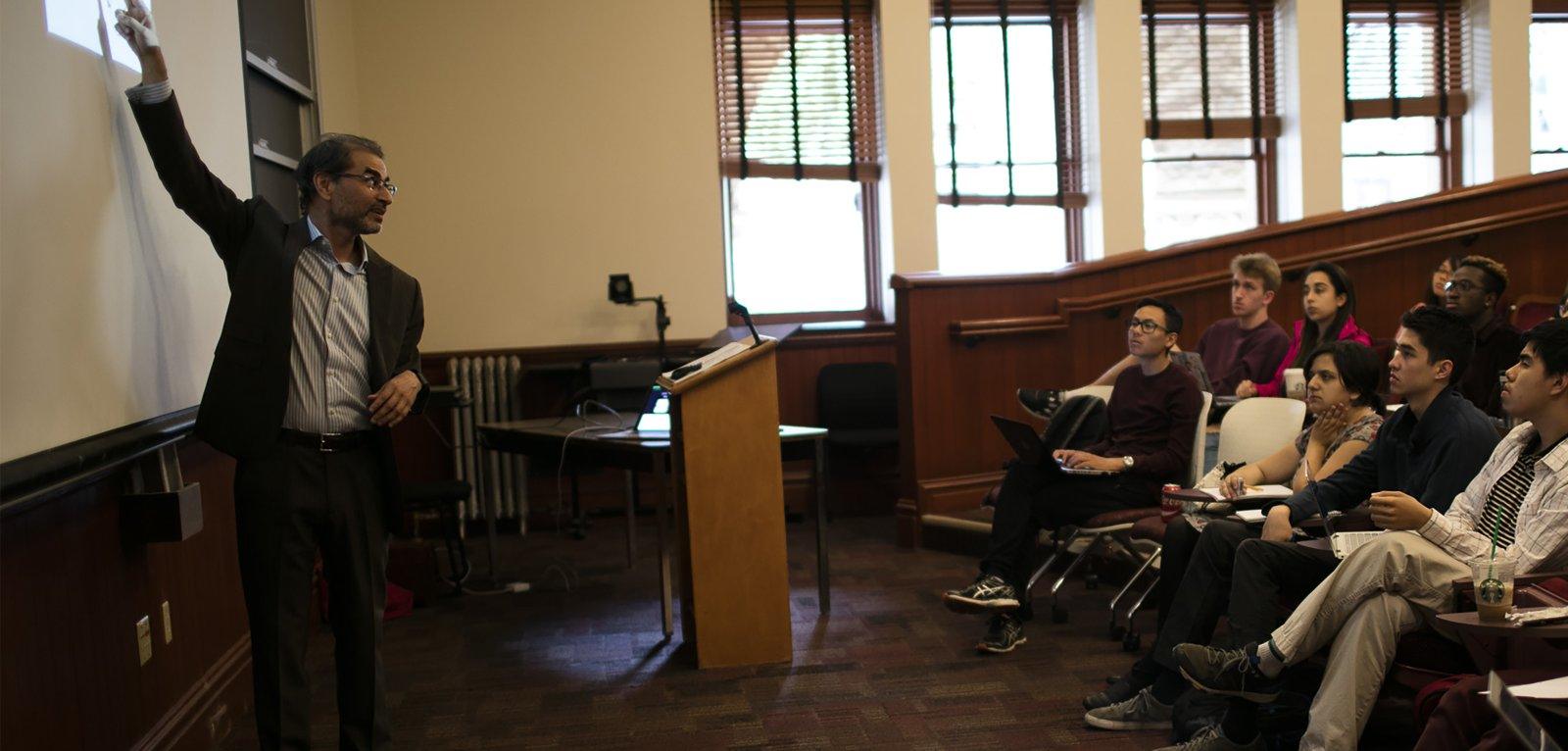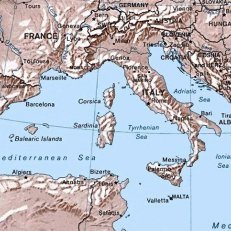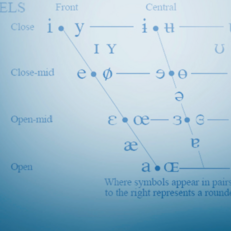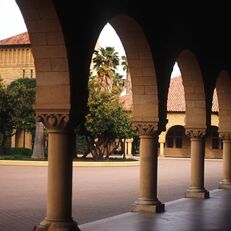
Academics and Research

African and African American Studies Department*
The Department of African and African American Studies provide students with an interdisciplinary introduction to the study of African, African American, and African descended people all over the world as a central component of American and world culture. The major offers a choice of three tracks: African American Studies, African Studies, and Global Black Diaspora Studies. Students will also participate in community engaged learning opportunities and language study.
*Note: Students will be able to declare majors and minors in the new Department of African and African American Studies starting Sept. 1, 2024.

African and African American Studies Program*
African and African American Studies (AAAS) provides an interdisciplinary approach to the study of peoples of African descent within societies worldwide. Courses promote research across departmental boundaries, allowing students to explore the intersections of gender, class, race, religion, and other dynamics.
The first ethnic studies program developed at a private institution in the United States, AAAS has established a network of scholars who bridge such fields as anthropology, art, economics, feminist studies, history, linguistics, and literature. It is closely associated with Stanford’s Center for Comparative Studies in Race and Ethnicity and many other centers on campus that support social progress though the expansion of knowledge.
View highlights of the AAAS program's undergraduate offerings.
Explore careers of undergraduate AAAS alumni.
*Note: Students can declare the AAAS interdisciplinary program major and minor through Aug. 31, 2024 (the AAAS IDP remains in H&S but will no longer accept new majors and minors after Sept. 1). Students will be able to declare a major or minor in the Department of African and African American Studies beginning Sept. 1.

American Studies
The interdisciplinary program in American Studies promotes a broad understanding of U.S. culture and society. It connects scholars of English literature, performance studies, education, sociology, and many other disciplines whose work examines the past and present of the United States and also shapes how the nation imagines its future.
Students design their own course of study while investigating the many dimensions of U.S. life—race, gender, technology, religion, and mass media, for example. Because the program spans many disciplines, students benefit from access to faculty in economics, history, music, and other departments. American Studies offers endless opportunities to apply the full range of Stanford’s resources to the project of understanding the U.S. in a global context.

Anthropology
Stanford’s Department of Anthropology focuses on the study of human beings and societies through the examination of social, historical, ecological, and biological change across time. Known for its innovative approaches, the department focuses on the full span of human history and full range of human societies and cultures, including those in marginalized parts of the world.
Students are encouraged to integrate theory and research methods as they explore a range of related subfields that include archaeology, ecology, evolution, linguistics, medical anthropology, political economy, and science and technology. Areas of faculty and student research include questions of social, cultural, and biological diversity and issues of power, identity, and inequality.
View highlights of the anthropology department's undergraduate offerings.

Applied Physics
The Department of Applied Physics focuses on solving technological and scientific challenges through the lens of physics. The department has a long tradition of building tools, from solid-state lasers to the atomic force microscope, with many advances becoming foundational in new fields of research and industries. Applied Physics has four main research areas: nano science and quantum engineering, lasers and particle accelerators, condensed matter physics, and experimental and theoretical biophysics.
Through collaboration and joint appointments with electrical engineering, biology, chemistry, and SLAC National Accelerator Laboratory, faculty and graduate students work on innovative concepts in foundational and applied physics that advance the boundaries of science.

Archaeology
Drawing methods and ideas from the humanities, social sciences, and natural sciences, archaeology introduces students to robust, multifaceted analyses of material culture and human societies. Coursework intersects with history, biology, earth systems, classics, anthropology, and other disciplines.
Stanford archaeology advances innovative research across the globe. The Archaeology Center on campus supports interdisciplinary collaboration as a venue where Stanford faculty and visiting scholars work to make the experiences of people, from the ancient past to the modern era, accessible in new ways. Students can apply what they learn in the classroom by participating in summer field schools in Europe, South America, and California.

Art and Art History
The Department of Art and Art History at Stanford encompasses the history of art, the practice of art in the studio, and film and media studies. Courses investigate the historical development of images and media and their influence on society, as well as their relationship to other disciplines such as literature and music.
Critical thinking and technical skills learned in the classroom inform the creation of artwork in studios, labs, screening rooms, and galleries on campus. Between lecture series, symposia, gallery exhibits, film screenings, and design presentations, the department participates in more than 60 events a year.
View highlights of the art and art history department's undergraduate offerings.
Explore careers of undergraduate art and art history alumni.

Asian American Studies
Center for Comparative Studies in Race and Ethnicity (CCSRE)
Asian American Studies (AAS) is dedicated to understanding Asian peoples in the U.S. from contemporary and historical points of view. With a broad range of interests and expertise, faculty in AAS take an interdisciplinary approach to studying the complex, diverse, and ever-changing cultures that constitute the Asian American experience.
Undergraduates at Stanford may earn a major or minor in Asian American Studies by taking courses in many departments, including history, English, anthropology, and music. The program is a home for students exploring every dimension of Asian American life from art and literature to social and cultural history to politics and policy. It provides an excellent foundation for appreciating complexity within a diverse, interdependent world.

Biology
Stanford’s top-ranked Department of Biology encompasses many sub-disciplines ranging from molecular biology to ecology. Through a core set of courses and specialized electives, undergraduate students study and analyze the building blocks of life, from molecules and cells to organisms and ecosystems.
Undergraduates and graduate students work with renowned faculty specializing in ecology, plant and animal physiology, population biology, genetics, immunology, neurobiology, cell and developmental biology, molecular biology, and biochemistry. In addition to working in labs on campus, students can pursue research at Jasper Ridge Biological Preserve in the foothills of the Santa Cruz Mountains and at Hopkins Marine Station in Pacific Grove on the Monterey Peninsula (which is part of the Doerr School of Sustainability).
View highlights of the biology department's undergraduate offerings.
Graduate joint degree offered: MD/PhD

Biophysics
The Stanford Biophysics Program is an interdisciplinary, interdepartmental graduate training program that leads to a doctoral degree. It brings together faculty from more than a dozen departments in the Schools of Humanities and Sciences, Medicine, and Engineering, as well as the Stanford Synchrotron Radiation Laboratory. Research in Biophysics applies the principles of chemistry and physics to solving biological problems with the help of the latest methodologies, such as computational biology and molecular analysis.
The program trains students to approach biological problems quantitatively. With the benefit of advanced coursework and exceptional facilities—including the Lucas Center for Imaging, which houses multiple whole-body MRI systems—students develop the skills needed to direct their own research to address critical problems in the field.

Chemistry
Through courses and lab work that promote collaboration and active learning, Stanford’s undergraduate program in chemistry teaches fundamental concepts key to advancing the molecular sciences. The department’s mission is to explore and advance new chemical frontiers in the life sciences, physical sciences, medicine, energy, and materials and environmental sciences through collaborative research and scholarship.
Undergraduate and graduate students have opportunities to work with leading faculty who study atomic and molecular systems, create new forms of matter, and develop experimental and theoretical tools to understand and control the behavior of electrons, atoms, molecules, and materials for the benefit of science and society.
View highlights of the chemistry department's undergraduate offerings.
Graduate joint degree offered: MD/PhD

Chicana/o-Latina/o Studies
Center for Comparative Studies in Race and Ethnicity (CCSRE)
The program in Chicana/o-Latina/o Studies deals principally with the important and growing population in the United States that originates from Mexico, Latin America, and South America. In the interest of understanding this population in its cultural, economic, and political dimensions, the program supports collaboration among faculty in a variety of disciplines.
Undergraduates who pursue a major or minor in Chicana/o-Latina/o Studies take an interdisciplinary approach to the full range of experiences relevant to the lives of Chicanas/os and Latinas/os in the U.S. today. Courses on topics such as poetry, film, childhood development, and educational policy are offered along with opportunities for learning through service. It is an intellectually rigorous course of study that addresses issues of major social significance.

Classics
Stanford’s Department of Classics takes an interdisciplinary approach to studying the literature and culture of the ancient world. Students examine history, language, literature, art, philosophy, and archaeology in courses that situate Greece and Rome in relation to other ancient societies.
At Stanford, classics is a dynamic field in which faculty and students employ diverse methods of study across media, genres, and time. Coursework delves into specialized fields such as ancient economics, law, and science to illuminate the relationships between various cultures and the ancient world’s influence on the contemporary one. Classics also collaborates with the Department of Philosophy to offer undergraduate and graduate joint programs in ancient philosophy.
View highlights of the classics department's undergraduate offerings.

Communication
Stanford’s Department of Communication focuses on studying the ways that communication techniques and technologies shape who we are, how we govern ourselves, and what kinds of cultures we inhabit as a society.
For undergraduate majors and coterminal master’s students, the department offers a broad introduction to the social and psychological power of communication. Master’s students in journalism pursue an intensive year-long program that emphasizes multimedia storytelling, data-driven reporting, and experimentation in immersive journalism about public affairs issues. Graduates work everywhere from Google News to The Washington Post. Doctoral candidates work with faculty within and beyond the department, developing their own research programs.
View highlights of the communication department's undergraduate offerings.
Graduate joint degree offered: JD/PhD

Comparative Literature
Division of Literatures, Cultures, and Languages (DLCL)
Comparative Literature (part of the Division of Literatures, Cultures, and Languages) provides students the opportunity to study literature in all its forms. While other disciplines focus on works of literature as parts of specific national or linguistic traditions, comparative literature examines the nature of literary phenomena themselves by drawing together texts from around the globe and from different historical periods. The department focuses on literary forms such as narratives, performance, and poetry, as well as cinema, music, and new emerging media.
Along with the traditional model of comparative literature that juxtaposes two or more national literary cultures, the department supports teaching and research that uses specialized tools of inquiry such as literary theory, the application of philosophy to literature (and vice versa), and other methods that enrich literary study.

Comparative Studies in Race and Ethnicity
Center for Comparative Studies in Race and Ethnicity (CCSRE)
Undergraduate students interested in exploring race and ethnicity from an interdisciplinary perspective may choose from a diverse array of courses as part of a major or minor in CSRE. Faculty in fields such as anthropology, economics, and philosophy teach in the program. In addition to coursework, students are encouraged to pursue their interests through internships, engagement with the community, and original research.
The Center for Comparative Studies in Race and Ethnicity supports scholarship that illuminates how race and ethnicity are essential aspects of society today. As a hub for interdisciplinary research and teaching, the center fosters a deep understanding of the past and develops tools to address current social problems in the interest of creating a more just and equitable world.
View highlights of the CSRE program's undergraduate offerings.

Data Science
Stanford’s Program in Data Science provides foundational knowledge for tackling data-driven problems in science, industry, and society. Students learn mathematical modeling, inferential thinking, and computational strategies. They consider the ethical use of data and technology and explore applications of data science to scientific challenges and social problems.
Students take courses in multiple departments, including mathematics, statistics, computer science, engineering, and the social sciences (BA). Electives allow students to define their own intellectual pathway. Capstone experiences provide opportunities for individual research projects or collaborative work with partners from industry, government, and nonprofits to put knowledge into action.
View highlights of the data science program's undergraduate offerings.

Democracy, Development, and the Rule of Law
Democracy, Development, and the Rule of Law (DDRL) is an honors program available to undergraduate seniors in any department or program at Stanford. Students in DDRL work closely with affiliated faculty and enjoy special opportunities to engage with visiting policymakers and government officials.
With the help of specialized instruction in research methods and regular workshops that facilitate collaboration, students who earn honors in DDRL produce original theses on such topics as technology’s impact on the political process, the history of immigration and border control, and global solutions to malnutrition.

Division of Literatures, Cultures, and Languages (DLCL)
The Division of Literatures, Cultures, and Languages (DLCL) is home to the departments of Comparative Literature, French and Italian, German Studies, Iberian and Latin American Cultures, and Slavic Languages and Literatures. The division’s faculty are expert teachers of numerous modern languages and scholars of culture, literature, history, politics, and philosophy in a wide range of traditions.
In courses on campus and in the Bing Overseas Studies Program, DLCL students learn to think critically and globally about how people use language to make sense of the world, to claim an identity and a place in history, to entertain, and to persuade. In addition to its majors, DLCL offers an undergraduate minor in Medieval studies and a PhD minor in philosophy, literature, and the arts.

East Asian Languages and Cultures
In Stanford’s Department of East Asian Languages and Cultures, students study China, Japan, and Korea through coursework on language, linguistics, literature, film, cultural studies, and visual arts. Small classes are led by faculty and visiting scholars whose specialties range from traditional poetry to modern politics.
Intense language training and cultural immersion are cornerstones of the department. Students can also participate in Stanford’s overseas program in Kyoto, where they can explore topics such as religion, art, and the culture and economy of contemporary Japan.

East Asian Studies
Stanford Global Studies (SGS)
Stanford’s master’s degree program in East Asian Studies combines language training, interdisciplinary area studies, and a disciplinary concentration. Students construct a course of study suited to their interests and career aspirations.
The program is designed for those who want to concentrate on East Asia at the doctoral level but have not selected a specific discipline, or for those who wish to pursue intensive area studies and language training before moving on to advanced study. Stanford offers a joint degree program in East Asian Studies and law and dual degree programs with education or business. The program also attracts students who plan to specialize in East Asian Studies for careers in fields such as government service or journalism.
Graduate joint degree offered: JD/MA

Economics
Stanford’s prestigious Department of Economics trains undergraduates and graduate students in the methods and ideas of modern economics. It collaborates with the medical school, the business school, and departments across campus. The department leverages Stanford's strengths in big data and machine learning methods to deepen the insights of the field, and its groundbreaking interdisciplinary foundational and applied research is expanding our understanding of broad issues such as social mobility and education.
Students can extend their education through research assistantships with faculty within the department and at the Stanford Institute for Economic Policy Research, where economists collaborate with leaders in business, technology, health care, and government on policy-oriented research.
View highlights of the economics department's undergraduate offerings.
Graduate joint degrees offered: JD/MA, JD/PhD, and MPP/PhD

English
In Stanford’s top-ranked Department of English, students analyze the culture of the written word through literature, focusing on traditions in English across a range of media. Coursework emphasizes interpretive thinking and creative writing; literary and cultural history; literary form and genre; and reading, writing, and critical analysis. The graduate program involves intensive training in the research and analysis of British, U.S., and other Anglophone literary histories and texts, preparing students to produce original scholarship and teach literature at the highest levels.
The department is also home to Stanford’s renowned Creative Writing Program, which offers workshops and tutorials in fiction, poetry, and nonfiction in addition to a reading series featuring prominent contemporary writers.
View highlights of the English department's undergraduate offerings.
Explore careers of undergraduate English alumni.
Graduate joint degree offered: JD/PhD

Ethics in Society
Ethics in Society offers undergraduates in any major the chance to earn honors by writing a thesis that applies moral and political philosophy to important social problems. Recent theses have focused on topical subjects such as inequality in education and the ethics of finance.
Students may also pursue a minor in Ethics and Society, engaging with moral issues, both personal and public. Choosing from a range of elective courses, students develop a foundation in ethical reasoning that may be applied to a particular theme, such as medicine, the environment, or technology.

Feminist, Gender, and Sexuality Studies
Feminist, Gender, and Sexuality Studies is an interdisciplinary program that provides students with the knowledge and skills needed to investigate the significance of gender and sexuality in all arenas of human life. Students learn to think critically about gender roles, relations, and identities and also how gender intersects with other social constructs such as class and ethnicity. The program offers outstanding support and opportunities through close partnerships with the Clayman Institute for Gender Research and the Stanford Women’s Community Center.
The program offers an undergraduate major and a minor, as well as the opportunity for students in any major to earn honors with a research paper or creative project. A doctoral minor is also available for students who desire a rigorous foundation in the field. Students are encouraged to design their own plans of study to align with their identities, interests, and goals.
View highlights of the Feminist, Gender, and Sexuality Studies program's undergraduate offerings.

French and Italian
Division of Literatures, Cultures, and Languages (DLCL)
The Department of French and Italian offers students the opportunity to pursue coursework in language, culture, literature, and intellectual history within the French and Italian traditions. The undergraduate programs in French and Italian provide a comprehensive study of their respective literatures and cultures, establishing a solid basis for further study in literature or history.
The curriculum is designed to benefit students at all levels of language proficiency and to meet a wide range of interests. Students who wish to explore international relations, European history and literature, film studies, philosophy, and post-colonial studies will find many relevant course offerings.

German Studies
Division of Literatures, Cultures, and Languages (DLCL)
The undergraduate program in German equips students with the language skills and analytic capacities needed to understand the cultures of German-speaking Europe. Students learn how to interpret complex literary and philosophical works, evaluate historical change, and immerse themselves in new cultures and societies. Students majoring in German often combine courses in the department with offerings from other fields in the humanities, arts, and social sciences.
The doctoral program provides training in the full range of German literary history, along with opportunities to pursue specialized research topics. All students participate in an ongoing colloquium for sharing writing and research, as well as in language teaching and other professionalization opportunities.

History
Stanford’s top-ranked Department of History teaches students to make sense of humanity’s past, present, and future while developing critical analytical skills and sophisticated ways of thinking. Courses teach students to evaluate original source material as well as synthesize information from multiple sources and formats in order to communicate its importance in clear, persuasive writing.
The department’s faculty has expertise in a wide range of historical periods, national histories, and regional studies. Its research explores such topics as law, race and ethnicity, and science and medicine in many historical contexts. The graduate program trains scholars who earn distinction in teaching and research, while undergraduates go on to pursue careers in law, government, medicine, and technology.
View highlights of the history department's undergraduate offerings.
Explore careers of undergraduate history alumni.
Graduate joint degrees offered: JD/MA and JD/PhD

Human Biology
Human Biology offers an interdisciplinary approach to understanding human beings from biological, behavioral, social, and cultural perspectives. Through teaching and research on topics such as environmental policy, genetics, and child development, the program promotes the welfare of humans as well as the world at large.
Students take courses in many departments, developing a strong, integrated foundation in the biological and social sciences, as well as statistics. Capstone projects in research or community service allow students to pursue an area in great depth. In addition to offering a major and a minor, the program also awards honors to undergraduates who write a thesis based on their own research.

Human Rights
Stanford Global Studies
The Center for Human Rights and International Justice offers an undergraduate minor in human rights open to students in any major or program. At Stanford and throughout the world, the center works to advance the cause of justice and human dignity. Students who pursue the minor work closely with experienced scholars and practitioners in the field of human rights in courses that apply history, philosophy, and political science to advocacy and experiential learning. For a capstone project, students may write a research paper, develop practical tools for the collection and analysis of data, or undertake creative work.

Iberian and Latin American Cultures
Division of Literatures, Cultures, and Languages (DLCL)
Studying Iberian and Latin American cultures means engaging in a deep and compelling exploration of the languages, literatures, and cinema of the Iberian Peninsula (primarily Spain and Portugal), Latin America, Brazil and Lusophone Africa, and Latina/o populations in the United States. The program balances an emphasis on literary studies with philosophical, historical, and social approaches to cultural issues.
As a result of its focus on critical thinking, open discussion, and close textual analysis, the undergraduate curriculum provides excellent preparation for a large number of professional fields. The graduate program provides rigorous and highly individualized advanced training in the analysis of Iberian, Latin American (including Brazil), and Latina/o literatures.

Interdisciplinary Arts
Stanford Arts Institute
Open to students in any major, the Interdisciplinary Arts Minor and Honors in the Arts programs support students in completing original projects under the guidance of academic and creative mentors. The programs support a diverse range of interdisciplinary experiences: Students are free to design projects that incorporate multiple arts disciplines and to integrate non-arts interests into either artistic practice or research. The minor requires 27 units of core and elective classes in addition to a capstone project. Honors student participate in weekly workshops during their senior year as they develop a creative thesis project.

International Policy
The Ford Dorsey Master's in International Policy (MIP) is an interdisciplinary program devoted to rigorous analysis of international issues in diplomacy, governance, security, global health, and environmental policy. The program integrates perspectives from political science, law, economics, history, and other disciplines, with a focus on implementation and administration of solutions to global problems.
The MIP program combines research and scholarship with practical training designed to prepare students for careers in public service and other settings where they can have an impact on international issues. The program allows students to specialize in cyber policy and security; energy, natural resources, and the environment; global health; governance and development; or international security.
Graduate joint degrees offered: JD/MA and MA/MPP

International Relations
Stanford Global Studies (SGS)
International Relations is an interdisciplinary undergraduate program focusing on the changing political, economic, and cultural relations within the international system in the modern era. The program explores how global, regional, and domestic factors influence relations between groups around the world, drawing on the expertise of faculty in economics, political science, and history.
Students gain a foundation in comparative politics, U.S. foreign policy, and economics, then specialize in a region or topic of their choosing, along with a relevant foreign language. There are also rich opportunities to become involved with ongoing research projects and work directly with faculty mentors.

International Security Studies
This program offers students, regardless of major, the opportunity to earn honors in international security studies. After coursework on national and international security and relevant technologies, students undertake a substantial research project, which they complete with the help of personalized guidance from faculty in a variety of disciplines. Recent graduates have written on such issues as religious extremism, missile defense, and climate change. Students in the program benefit immensely from access to the vibrant intellectual environment of Stanford’s Center for International Security and Cooperation (CISAC), a hub for leading researchers in the field.

Jewish Studies
Center for Comparative Studies in Race and Ethnicity (CCSRE)
This interdisciplinary program offered by the Taube Center for Jewish Studies promotes research on Jewish literatures, languages, religion, politics, and history. In addition to traditional strengths in history and religious studies, the program also comprises scholarship on the role of the arts, especially music and theater, in Jewish culture.
Courses offer a rich understanding of the many areas of Jewish studies, such as Jewish history, Israeli culture, religious literature, and the Hebrew and Yiddish languages. Undergraduates may earn a major or minor in Jewish studies. The Taube Center also supports graduate students and visiting scholars as part of its mission to educate the broader community, Jewish and non-Jewish, through lectures and other public events.

Latin American Studies
Stanford Global Studies (SGS)
Stanford Global Studies offers a master’s degree in Latin American Studies. The curriculum is based on courses surveying the history, politics, culture, and ecology of the region. Students enjoy opportunities to interact with leading scholars, including distinguished visitors from Latin American or Iberian countries who come to Stanford each year as Tinker Visiting Professors.
Stanford’s Center for Latin American Studies oversees programs for students, coordinates a range of conferences and lectures, and provides fellowships and funding to support research by faculty in many fields of study. Training in the languages of Latin America, including indigenous languages such as Nahuatl, and coordinating resources and services for immigrants are important parts of its mission.
Graduate joint degree offered: JD/MA

Linguistics
In Stanford’s undergraduate program in linguistics, students analyze the structure of language with close attention to sound, meaning, words, and sentences and learn how these structural patterns vary over time. Courses also draw connections between linguistics and anthropology, psychology, and cognitive and computer sciences, among other disciplines.
The graduate program emphasizes theoretical work based in empirical language data. Research and teaching explore a range of topics that includes computational linguistics, historical linguistics, language acquisition, psycholinguistics, semantics, and sociolinguistics. Linguistics also collaborates with Stanford’s departments of computer science, philosophy, and psychology to offer interdisciplinary doctoral study in cognitive science.
View highlights of the linguistics department's undergraduate offerings.

Master of Liberal Arts
A part-time master's degree program for adults, Stanford's Master of Liberal Arts (MLA) offers the opportunity to pursue an interdisciplinary course of study through evening classes and a flexible academic schedule.

Mathematical and Computational Science*
The program in Mathematical and Computational Science (MCS)* serves undergraduates who want to pursue data science and applied mathematics. Its faculty are drawn from computer science, engineering, and statistics, and the curriculum provides an understanding of mathematics in the context of the information sciences.
Students in MCS gain skills in computation, probabilistic modeling, statistical inference, and optimal decision-making. Thanks to the program’s interdisciplinary design, students learn to apply their expertise to problems in science and technology, as well as management and the social sciences. Graduates pursue professions that demand high competence within diverse technical frameworks and social environments.
*The MCS program will no longer be accepting students for the major and minor as of Aug. 31, 2022. The Data Science major replaces MCS effective Sept. 1, 2022. Currently enrolled MCS majors and minors will be able to complete their degrees.

Mathematics
The undergraduate mathematics program encompasses the full range of pure and applied mathematics. The major is flexible at incorporating math-related coursework in nearby areas such as physics, machine learning, cryptography, and finance. The department provides students with opportunities for extensive experience with logical reasoning, generalization, and proofs to communicate sound arguments, as well as the creation and interpretation of mathematical models for reliable data analysis (such as in computer science and computational biology). Undergraduates can earn a major or minor in mathematics. Many mathematics majors earn a double major followed by either graduate school in mathematics or nearby fields, or a career in the corporate sector, tech industries, or government agencies.
The expertise among the faculty covers the traditional areas of pure mathematics (algebra, analysis, and geometry) along with fields nearer to computer science (such as probability and combinatorics) and applied mathematics. There are graduate courses in a wide array of areas at the introductory and advanced levels due to the breadth of the faculty, some of whom have a joint appointment in the statistics department. The department hosts many distinguished visitors throughout the year and there are numerous weekly seminars on topics related to contemporary research.
View highlights of the mathematics department's undergraduate offerings.

Medical Humanities
Anthropology
Undergraduates with any major may pursue a minor in Medical Humanities. Combining the field of medicine with art, literature, film, history, policy, and the social sciences, the minor explores the rich terrain of the human experience as students learn to appreciate the human body and medical issues from multiple disciplinary and aesthetic perspectives.
Medically inclined students can use the minor to broaden their interpersonal knowledge and skills, but it is also relevant for undergraduates interested in the meaning and experience of diagnosis, the way that medicine is an art form as well as a science, and the way institutions and culture shape how illness is identified, experienced, and treated.

Modern Thought and Literature
Modern Thought and Literature (MTL) is an interdisciplinary graduate program directed by faculty in English, theater and performance studies, comparative literature, and law. The program, which explores critical approaches to modernity, supports research in literature, film, popular culture, technology, ideology, and more.
MTL students are trained in literary and cultural studies as well as disciplines such as anthropology, gender studies, or sociology. The program expects that many of its alumni will go on to become innovative teachers and scholars in all areas of the humanities.
Graduate joint degree offered: JD/PhD

Music
Through courses based in theory, musicianship, analysis, and history, Stanford’s Department of Music trains students for careers as composers, performers, teachers, and scholars. The department supports a culture that is not only firmly rooted in history and tradition but also vigorously engaged with the technological and artistic evolution of sound. Resources include the Archive of Recorded Sound—where students can explore the progression of music on formats from wax cylinders to streaming media—and the Center for Computer Research in Music and Acoustics, a multidisciplinary facility that serves composers and researchers collaborating at the crossroads of technology and art.
Campus-wide, the department also promotes the enjoyment and understanding of music through private lessons. Students enjoy extraordinary opportunities to participate in ensembles, chamber groups, and major productions.
View highlights of the music department's undergraduate offerings.

Native American Studies
Center for Comparative Studies in Race and Ethnicity (CCSRE)
Native American Studies supports scholarship on Native communities in the interest of preserving and appreciating their unique social systems, languages, and natural resources. Its courses are housed across campus departments and schools including sociology, education, anthropology, archeology, English, art history, linguistics, and law.
A major or minor in Native American Studies introduces students to a broad range of approaches to the academic study of indigenous cultures while promoting understanding of both the traditions and the continuing experiences of Native American peoples and communities. Students may pursue a plan of study that integrates specialized courses with the methods of other disciplines such as history and psychology.

Philosophy
Stanford’s Department of Philosophy offers rigorous programs in the traditional core areas of philosophy as well as opportunities to explore subfields including feminist philosophy and aesthetics. Its traditional strengths in logic and the philosophy of science are complemented by strong programs in action theory, ethics and political philosophy, language, mind and epistemology, and the history of philosophy, especially ancient philosophy and Kant studies.
Students of philosophy learn to think critically about the sources of knowledge and value, to express difficult ideas with clarity, and to make strong arguments. For undergraduates the department offers a general course of study as well as special programs in the history and philosophy of science and in the intersection of philosophy and literature. Graduate students are welcomed into a vigorous intellectual community where they participate in workshops, in reading groups, in colloquia, and in nearly all aspects of department life on an equal basis with the faculty.
View highlights of the philosophy department's undergraduate offerings.
Explore careers of undergraduate philosophy alumni.
Graduate joint degree offered: JD/PhD

Physics
Stanford’s undergraduate physics program offers a solid foundation in classical and modern physics in a top-ranked department. Courses in physics reveal the mathematical beauty of the universe at scales ranging from subatomic to cosmological. The program also includes labs in which students can develop their own experiments. Astronomy, astrophysics, and cosmology courses are also offered through the department.
Graduate students have opportunities to pursue research in astrophysics, cosmology, particle physics, atomic and laser physics, and condensed matter physics. In addition to working with leading faculty in both physics and applied physics, students collaborate with researchers in the schools of engineering and medicine and at SLAC National Accelerator Laboratory.
View highlights of the physics department's undergraduate offerings.
Graduate joint degree offered: MD/PhD

Political Science
Stanford’s top-ranked Department of Political Science offers students the opportunity to study domestic and international political systems through courses on governance, public policies, political behavior, and institutional design. The undergraduate major focuses on political systems within the context of global forces, international conflicts, social movements, ideological systems, and diversity. Students study a variety of research methods, both quantitative and qualitative, and develop effective written and oral communication skills. The department trains students to be citizens prepared for a range of careers that require analytical thinking and knowledge of sophisticated research methods.
Departmental research areas include U.S. politics, comparative politics, international relations, political methodology, and political theory.
View highlights of the political science department's undergraduate offerings.
Graduate joint degree offered: JD/PhD

Psychology
Stanford’s renowned top-ranked Department of Psychology has a long-standing tradition of groundbreaking theoretical research that also has a powerful impact in the real world. The department supports teaching and research devoted to a better understanding of human nature and behavior. Areas of research include cognitive and developmental psychology, neuroscience, social psychology, and the study of emotion.
The undergraduate program offers excellent training in understanding human behavior using scientifically rigorous methods. Students have opportunities to become research assistants in faculty labs and also work at Stanford’s Bing Nursery School and SPARQ (Social Psychological Answers to Real-World Questions), the department’s “do tank” that creates and shares social psychological insights to help improve society.
View highlights of the psychology department's undergraduate offerings.
Graduate joint degrees offered: JD/PhD and MPP/PhD

Public Policy
The program brings together economics, political and moral philosophy, psychology, and legal studies with the aim of understanding public policy. Faculty from across the university have expertise in topics such as health care, education, national and international security, and criminal justice.
Along with an appreciation of ethical and pragmatic issues, students learn how to approach and evaluate major public policy challenges. Courses provide a foundation in economics and political science as well as opportunities to study policy in relation to energy, the environment, technology, and urban development. Seniors demonstrate their capacity to understand and solve pressing problems through seminars or independent research. The program also offers opportunities for graduate study.
Graduate joint degrees offered: JD/MA, JD/MPP, MA/PhD, MBA/MPP, MD/MPP, MPP/MS, and MPP/PhD

Religious Studies
Stanford’s Department of Religious Studies provides a range of perspectives on the history, literature, thought, and practice of religious traditions. In addition to housing core faculty with strengths in the study of Islam, Christianity, Judaism, and Buddhism, the department collaborates with a number of programs on campus. These include the Department of Philosophy, the Ho Center for Buddhist Studies, the Taube Center for Jewish Studies, the Abbasi Program in Islamic Studies, and the Center for Medieval and Early Modern Studies.
The department also supports the study of languages needed to understand sacred texts and interpretive traditions, as well as research at Stanford’s overseas centers, where religions can be observed and experienced in their appropriate cultural contexts.
View highlights of the religious studies department's undergraduate offerings.

Russian, East European, and Eurasian Studies
Stanford Global Studies (SGS)
The Center for Russian, East European, and Eurasian Studies (CREES) advances interdisciplinary approaches to a vast region stretching from the Berlin Wall to the Bering Strait. In addition to supporting undergraduate and doctoral students, it offers a one-year master’s program providing intensive study for students with an academic background in the region.
Degree programs in CREES combine language and area courses with work in the social sciences and humanities. Students' professional interests include government, journalism, business, and non-governmental organizations. CREES also attracts students pursuing doctoral or professional degrees who desire intensive area studies and language training.
Graduate joint degree offered: JD/MA

Science, Technology, and Society
The interdisciplinary program in Science, Technology, and Society (STS) offers a modern liberal arts education by bringing together scholars from fields such as anthropology, computer science, and sociology to explore the impact of scientific discoveries and how people understand their relationship to technology.
Through courses in the humanities, social sciences, natural sciences, and engineering, students acquire technical skills along with an understanding of the history of science as well as the values and economic forces that guide technological change.

Slavic Languages and Literatures
Division of Literatures, Cultures, and Languages (DLCL)
The Department of Slavic Languages and Literatures teaches Russian language, literature, and cultural history, with a strong emphasis on literary theory and criticism. From freshman and sophomore seminars, which do not require specialized knowledge or knowledge of Russian, to advanced graduate seminars in Russian, the department offers courses that serve a wide range of interests.
Students pursuing majors in the department will become experts on a region that plays an important role in the world today and acquire the knowledge of philosophy, history, and cultural studies that will allow them to put this expertise to use. Along the way they can expect to master not only the Russian language but also the critical thinking, analytic, and writing skills necessary to succeed in a wide range of professional fields.

Sociology
The Department of Sociology, one of the best in the nation, teaches students how to understand and address social issues that affect everything from interpersonal relations to global warming. Students develop a broad grasp of fundamental sociological theories and the methodological skills used to evaluate human behavior and social organizations.
The faculty also lead respected university centers such as the Institute for Research in the Social Sciences, the Clayman Institute for Gender Research, and the Stanford Center on Poverty and Inequality.
View highlights of the sociology department's undergraduate offerings.
Graduate joint degree offered: JD/PhD and MPP/PhD

Stanford Global Studies (SGS)
The Stanford Global Studies Division (SGS) is home to 14 centers and programs dedicated to exploring issues, societies, and cultures in regional and global perspective. SGS equips Stanford students with the interdisciplinary knowledge and skills essential to leading in a global context and fosters innovative research that deepens society’s understanding of critical regions and global issues.
SGS offers a minor in global studies, which is available to any undergraduate student who desires an intensive program of study dedicated to one of several global regions. Students enrolled in the minor can specialize in African studies, European studies, Iranian studies, Islamic studies, Latin American studies, or South Asian studies. Students are encouraged to undertake training in languages appropriate to their interests and to complement their coursework through one of many opportunities offered by the Bing Overseas Studies Program.

Statistics
Stanford’s top-ranked Department of Statistics gives students a foundation in the role of probabilistic and statistical ideas and methods in science, medicine, technology, and the humanities. Faculty provide instruction in the theory and application of commonly used techniques in the field, while offering training through innovative programs. The department administers a mathematical and computational science major for undergraduates,* a data science track through its master’s program, and a doctoral training program in biostatistics for personalized medicine.
To foster the relationship between theory and application, the department also promotes interdisciplinary collaboration through faculty appointments in economics, education, political science, and other fields.
Graduate joint degree offered: MD/PhD
*The MCS program will no longer be accepting students for the major and minor as of Aug. 31, 2022. The Data Science major replaces MCS effective Sept. 1, 2022. Currently enrolled MCS majors and minors will be able to complete their degrees.

Symbolic Systems
Symbolic Systems is an interdisciplinary program that investigates both the computer and the human mind as systems that use symbols to communicate and represent information. Faculty approach the relationship between humans and computers by way of theoretical and technical expertise in cognitive science, linguistics, philosophy, and other fields.
Students learn technical skills in mathematics and computer programming, along with a foundation based on humanistic perspectives and empirical research. Many students go on to pursue advanced studies in artificial intelligence, neuroscience, or the philosophy of language.
Graduate joint degree offered: JD/MS

Theater and Performance Studies
At Stanford’s Department of Theater and Performance Studies (TAPS), students receive instruction—in the classroom and onstage—from faculty as well as artists-in-residence. The curriculum integrates theory, criticism, and a historical study of drama with the experience of live performance in theater spaces on campus. Students apply analytical skills developed in courses to artistic endeavors that range from performing in classic dramas and stage-managing musicals to creating costumes for period pieces and directing experimental one-act plays.
The department also houses a Dance Division, in which students consider movement both as performance and as a cultural, political, and social lens for understanding the body and the world. Courses covering critical and historical perspectives on dance complement studio classes that teach forms ranging from ballet to hip-hop.

Urban Studies
The Urban Studies program uses theoretical and practical approaches to understand the nature of cities. Research and teaching focus on why people live in cities and how urban environments affect human development, addressing contemporary problems related to poverty, education, and transportation. Faculty in law, economics, business, communication, engineering, and literature work closely with the program.
Undergraduates learn about the history of urbanization as a political and social phenomenon and study the methods of qualitative and quantitative research. The program also encourages community service and internships in government or the private sector. Stanford’s programs in New York City and Washington, D.C. both offer outstanding opportunities for urban studies students.